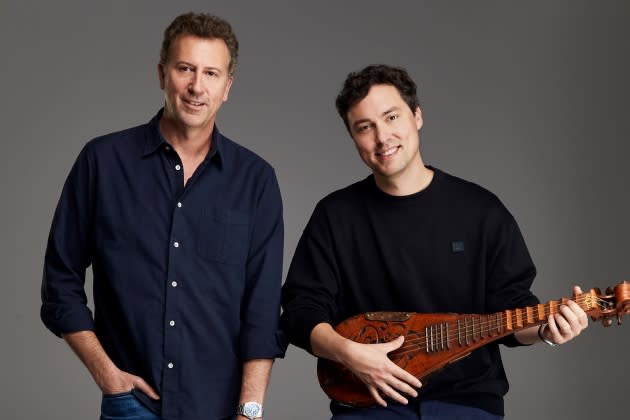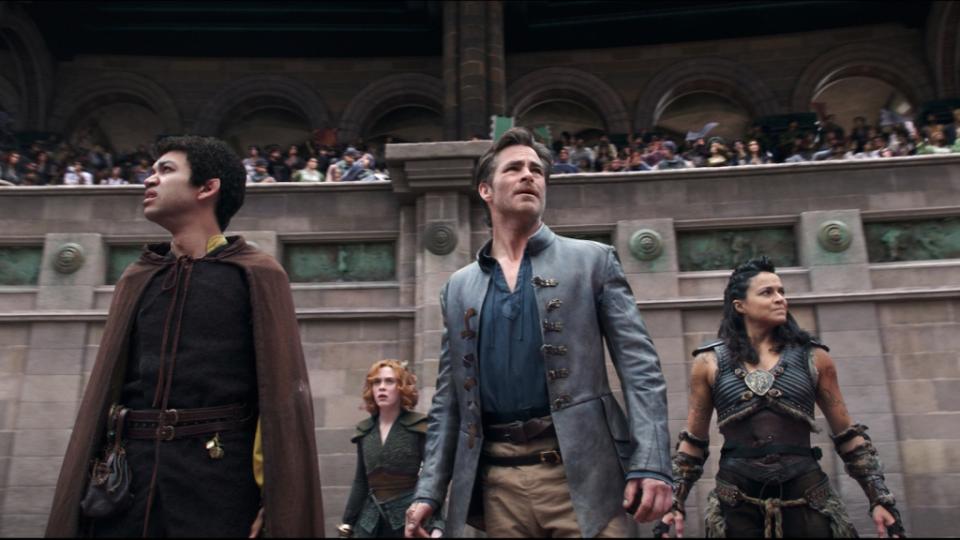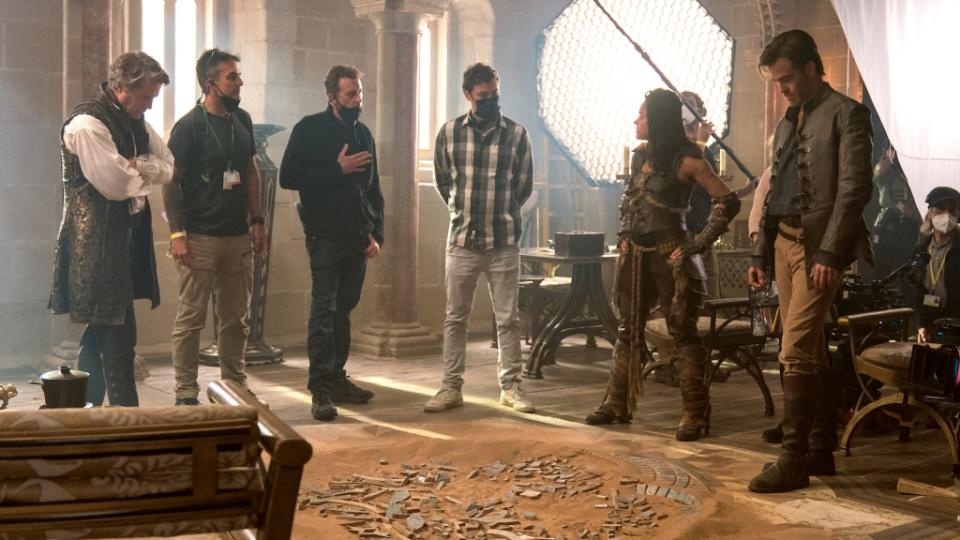‘Dungeons & Dragons’ Directors on Ensuring the Film ‘Isn’t Just for Nerds’ and Why They Left ‘The Flash’

John Francis Daley and Jonathan Goldstein have been to the SXSW Film Festival twice before — for 2013’s “The Incredible Burt Wonderstone,” which they wrote, and 2019’s “Stuber,” which they produced. But when the pair debut the action-comedy “Dungeons & Dragons: Honor Among Thieves” as the opening film of the annual Austin event this Friday, it will be the first time they’ve done so as directors. They couldn’t be more excited.
“It’s the perfect setting for this movie,” Goldstein says, sitting in the Paramount lot office he shares with Daley, for an interview with Variety about the release of their latest movie.
More from Variety
“It feels like the quintessential South By film,” Daley adds. “It’s big and all-encompassing but there’s also something a little bit subversive about it.”
If it wasn’t for a Chicago Cubs game and a lightning-fast superhero, however, it may have never happened.
In June 2019, Daley and his wife, both big Cubs fans, stepped into a local sports bar in the Valley, eager to watch the Chicago baseball team play the Los Angeles Dodgers. They wound up sitting next to a literary agent who began chatting up Daley about his career as a filmmaker. For a decade, Daley and Goldstein have charted a path as screenwriters (including 2011’s “Horrible Bosses” and 2017’s “Spider-Man: Homecoming”) and directors (2015’s “Vacation,” 2018’s “Game Night”) that landed them a coveted job writing and directing the DC movie ‘The Flash” — a job which Goldstein and Daley had just left. That news that had not yet been announced, but Daley let it slip to the agent.
“And he’s like, ‘So you guys are looking for your next thing?'” Daley recalls.
That agent tipped off Paramount, who invited Daley and Goldstein in for a meeting and handed them the script to “Dungeons & Dragons,” an adaptation of the 50-year-old fantasy role playing game that has shaped the minds of untold millions of players around the world. (Paramount is co-producing the movie with eOne, which is owned by Dungeons & Dragons parent company Hasbro.)
“Had we not gone to a bar in Sherman Oaks in the middle of the day, we may not have been working on this thing for the last four years,” Daley says with a laugh.

By that point, Daley and Goldstein had been working on “The Flash” for over a year, as the latest in a storied parade of filmmakers — including Phil Lord and Christopher Miller, Seth Grahame-Smith, Rick Famuyiwa and Robert Zemeckis — who’d entertained directing the first live-action movie about the Scarlet Speedster. The film’s star, Ezra Miller, had played the Flash, a.k.a. Barry Allen, already in 2016’s “Batman v Superman: Dawn of Justice” and 2017’s “Justice League,” and Goldstein and Daley saw in Miller’s youthfully playful performance a chance to break away from what Daley calls “this mounting sense of fatigue” among audiences for the tropes of superhero cinema.
“We pitched this idea of a ground-level superhero where it isn’t entirely end-of-the-world stakes,” Daley says. “He’s just learning his powers and is also somewhat dysfunctional with his life. The more imperfect we can make a superhero, the better, because that’s the inherent challenge: How do you give imperfection to someone that is, you know, physically perfect?”
Goldstein and Daley say they met with Miller once over dinner before they began working on a script. “They were intense and very bright,” Goldstein says of the actor. “Later, it became clear that they didn’t want to quite do the same thing as we did.”
Miller reportedly wrote a rival version of the script with Grant Morrison, which the studio ultimately passed on. But by that point, Goldstein and Daley were ready to move on.
“It was a number of creative differences that caused us at a certain point to decide that it was time to go,” Daley says.
Adds Goldstein, “If we feel like the powers-that-be aren’t excited about making the same movie as we are, we’re not going to win that battle. And so it’s better to cut your losses and get out of there.”
Director Andy Muchietti (“It”) and screenwriter Christina Hodson (“Birds of Prey”) took on the project and ultimately got it to a greenlight. Goldstein and Daley, who have a story by credit on the film, recently got to screen it, and they still see their DNA in the movie.
“They took what we had started and really ran with it and made it a very fun and emotional movie,” Goldstein says. “We’re really happy with how it all turned out.”
The fate of “The Flash,” which Warner Bros. is committed to releasing in June, remains unclear in the wake of Miller’s troubling, and headline-grabbing, behavior starting in 2020, including video of Miller choking a woman in Iceland, allegations of abuse and harassment and arrests that led to a no-contest plea for misdemeanor disorderly conduct in Hawaii and a guilty plea to unlawful trespassing in Vermont. (In August, Miller issued a blanket apology for their behavior and said they are in “ongoing treatment” for “complex mental health issues.”)
When asked about Miller’s actions, Goldstein and Daley choose their words carefully.
“All I can say is, having been through the trying process of making a massive film in the best of circumstances, I was very empathetic toward the people that put a loooot of time and then themselves in making the film, like Andy and Christina,” Daley says. “I can only imagine how fraught that must have been for them. But I’m so glad that the finished product is a super fun movie.” He laughs nervously. “Is that diplomatic?”
Goldstein jumps in. “Obviously, you don’t want any headwinds when you’re trying to put a giant, expensive movie out in the world,” he says. “And hopefully, the quality of the film will come through, and people will embrace it.”

One of the qualities the filmmakers say they most strove to bring to “The Flash” is also something they infused into “Dungeons & Dragons” — namely, ensuring that the enormously popular source material didn’t overwhelm the character-driven story at the film’s center.
“I’m not a huge superhero guy,” Goldstein says. “I collected comics as a kid, and I enjoy the Marvel movies. But what hooks me in is the story and the people in it. That’s how we approached D&D. It wasn’t about so much, OK, what monsters is going to end with? What dragon we can include? It was: Who’s our team? Because that’s the core of D&D. Who are we playing with at the table? Who are your friends? What are the characters they take on as their avatars, and why are we going to care about them? That was how we approached the whole movie.”
Both men played Dungeons & Dragons as teenagers, and Daley had a game going as an adult for several years before making the movie. But they also knew they had to broaden their film beyond the game — which has, until recently, felt inaccessible to anyone who isn’t a major fan.
“There is that stigma that you have to get over that this isn’t just for the nerds,” Daley says. “There’s something bigger and more cinematic.” They briefly entertained the idea that the film could be about people playing the game, but quickly ruled it out, especially after the release of 2019’s “Jumanji: The Next Level,” in which regular people become embodied as avatars within a video game.
“The moment ‘Jumanji’ came out, we said, ‘No, we can’t do this again,'” Daley says. “Also, it does a little bit of a disservice. It reduces D&D to just a game and I think that there is so much that can be explored within that world. And it’s hard, stakes-wise, to care about a character that you know as an audience is being played by someone who’s safely in their home.”
Instead, the directors let the action of the story be informed by the open-ended nature of how players approach the game, in which a party of fantasy archetypes try to figure their way through an elaborate campaign.
“It’s a lot of [the charaters] throwing ideas around, some of them kind of shitting on those ideas, and ultimately, seeing if that idea can come to come to fruition,” Daley says.
Adds Goldstein, “It was our way of capturing what goes on at the table when you’re playing D&D without breaking the fourth wall, or actually becoming meta with it.”
Ultimately, the filmmakers brought that same spirit of creative exploration to the process of writing the script — which, they hope, will translate to the audience’s experience.
“When we were writing that first draft, it was so much fun,” Daley says. “Often in first drafts, you have the freedom to write exactly what you want it to be. To the credit of the studio and eOne and all the brand holders, they really did let us preserve our vision throughout. I mean, there were arguments over what should happen and this and that, but nothing that felt insurmountable. We’re really proud of this. It very much captures the film that we envisioned when we started.”
Best of Variety
Final Oscars Predictions: Animated Short - Will the Academy Go for 'The Boy' or 'Dicks?'
Final Oscar Predictions: Documentary Short - Will the Academy Go for Malala or 'Elephants?'
Sign up for Variety’s Newsletter. For the latest news, follow us on Facebook, Twitter, and Instagram.
